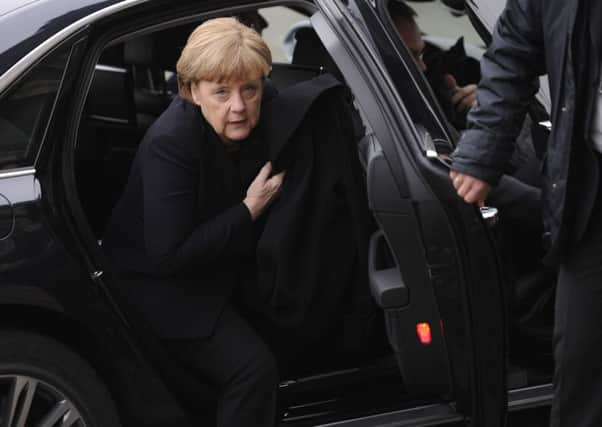Chris Bond: Why Merkel still matters as May and Trump meet


In 2015 Angela Merkel was applauded at the United Nations for her humanitarian stance and heralded by Time magazine as its person of the year.
Germany’s Chancellor was praised when she took the lead in opening up her country’s borders, temporarily suspending an EU rule that required asylum seekers to register in the first member state they entered.
Advertisement
Hide AdAdvertisement
Hide AdBut such was the sheer scale of the influx of migrants, mostly from Iraq, Afghanistan and Syria, that Merkel was faced with a politically unpalatable choice: either pull up the drawbridge and clamp down on this mass movement of humanity – more than a million people crossed into Europe in 2015 alone – or show compassion, a quality rarely seen in politics. She chose the latter.
In defending her decision to agree to take in a million migrants she told the German people “Wir schaffen das”, or “We can do this”.
Fast forward two years and Europe is facing arguably its biggest existential crisis since the collapse of Communism, and perhaps even since the end of the Second World War. A string of terrorist attacks by Islamic extremists has led to Merkel’s open-door immigration policy being fiercely criticised, with US President Donald Trump claiming she had made a “catastrophic” mistake.
It probably explains why Theresa May – and not the German Chancellor – will be the first international leader to meet the newly-inaugurated President Trump at the White House later today.
Advertisement
Hide AdAdvertisement
Hide AdFor the past eight years Angela Merkel and Barack Obama have been the vanguards of liberalism – with the former president calling the German chancellor his “closest international partner”.
But fear and anger now hangs over Europe, fuelling a resurgence in nationalism that has shifted the political axis and left social democracy in a state of crisis. Both David Cameron and Italy’s Matteo Renzi came unstuck over referendums while Francois Hollande – the most unpopular French president in history according to recent polls – wisely decided not to seek re-election.
But if you thought 2016 brought seismic political changes, then this year could prove to be even more dramatic. In April, the French people go to the polls to vote for a new president. In previous elections the centre left and centre right have joined forces to keep out the far-right National Front – but the fear is that this time round its leader Marine Le Pen could be swept to power.
Last weekend Le Pen told a meeting of right-wing politicians in Germany that patriotism was the policy of the future, adding that 2017 would be the “year of the awakening” for European people. The presidential candidate predicted that voters in France, Germany and the Netherlands would follow their British and American counterparts and reject the political establishment.
Advertisement
Hide AdAdvertisement
Hide AdShe was backed by Dutch politician Geert Wilders, leader of the anti-immigration Freedom Party (PVV), who said the people of the West were “throwing off the yoke of political correctness”. Wilders, who was found guilty of insulting and inciting discrimination against Moroccans last month, hopes to become Dutch prime minister in March and is polling strongly.
But are these really the kind of leaders we want? At a time of growing uncertainty, we don’t need political extremists or flawed, charismatic figures.
The history books are full of people like that and we live with the reminders of the devastation they so often leave behind.
If Le Pen and Wilders were to win power, and thankfully at this stage it is a big “if”, it would surely sound the death knell for the EU.
Advertisement
Hide AdAdvertisement
Hide AdThis explains why all eyes will be trained on the German election later this year. Angela Merkel has said she will stand for a fourth term, following in the footsteps of Germany’s longest-running post-war leaders Konrad Adenauer and Helmut Kohl.
Merkel has long been regarded as a safe pair of hands, the embodiment of prudence and pragmatism and there was a time when the woman affectionately known as “mutti”, or “mother”, would have been a shoo-in. Not any more. Though she will probably go into the contest as favourite, her popularity is sagging and there has even been some disquiet from within her own party.
The trouble is we have short memories. It’s perhaps ironic that 75 years after Germany brought Europe to its knees it has become the continent’s economic driving force and a standard bearer of freedom and liberalism. But then the German people know the dangers of nationalism and where it can lead.
Today, as Holocaust Memorial Day is marked with solemen reflection, we live in a world where the political urge is to build walls rather than bridges, where anger trumps tolerance and where empty slogans are thrown around like confetti.
Advertisement
Hide AdAdvertisement
Hide AdPolitical discourse has grown increasingly fractious and, at times, incendiary, which is precisely why we need the understated and calm diplomacy of people like Angela Merkel more than ever and, perhaps, more than we would dare to admit.